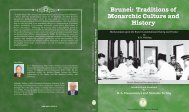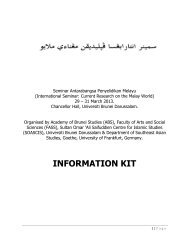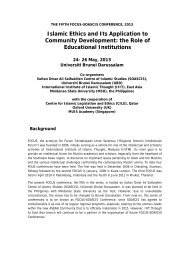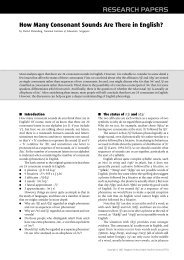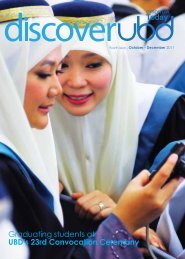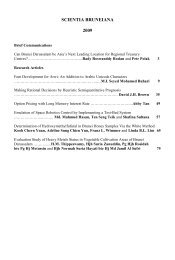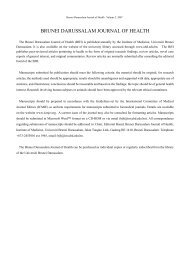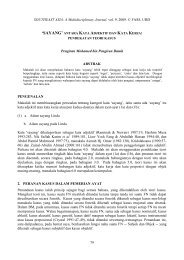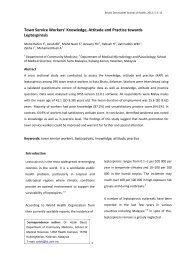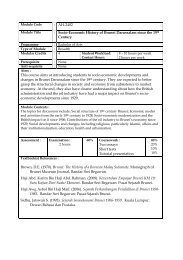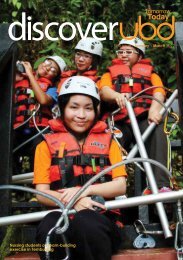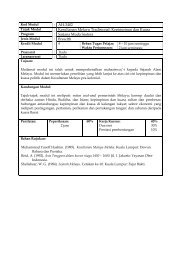Seventh issue . July - September 2012 - Universiti Brunei Darussalam
Seventh issue . July - September 2012 - Universiti Brunei Darussalam
Seventh issue . July - September 2012 - Universiti Brunei Darussalam
You also want an ePaper? Increase the reach of your titles
YUMPU automatically turns print PDFs into web optimized ePapers that Google loves.
12DiscoverNEWSDiscoverNEWS13UBD formally accredits RIPAS and SSB asteaching hospitalsJune <strong>2012</strong> marked another milestone in medicaleducation in <strong>Brunei</strong>, with the formal accreditationof the two largest public hospitals in the country asteaching hospitals by the PAP Rashidah Sa’adatulBolkiah Institute of Health Sciences, <strong>Universiti</strong> <strong>Brunei</strong><strong>Darussalam</strong> (UBD). Both the RIPAS (Raja IsteriPengiran Anak Saleha) hospital in the capital andthe Suri Seri Begawan (SSB) hospital in the Belaitdistrict have a long history of active involvementin undergraduate as well as postgraduatemedical education. In 2000, RIPAS was accreditedas a teaching hospital by the QueenslandUniversity Hospital. However, this is the first formalaccreditation of both sites as teaching hospitals bythe national university in <strong>Brunei</strong> <strong>Darussalam</strong>.UBD PhD candidatepromotes sustainableconsumption in EstoniaPublic Profile:Professor VictorTerrence KingBy Wan Bazlaa KarimThe accreditation by UBD is valid for three years, and will be a continuing process. The accreditationprovides recognition of the hospital’s contributions by doctors, nurses and allied health professionalsin clinical education. It also seeks to strengthen future cooperation and collaboration between thehospitals and the university.The accreditation process to become a teaching hospital is rigorous, and involves the attainment of someimportant criteria, including the adequacy of educational resources, evidence of teaching and trainingplans and outcomes, research, continuous development of clinical faculty in professionalism, academicexchanges and community education and adequacy in administration support.Teaching hospitals provide specialised services and advanced technology to treat rare diseases andcomplex patients, offer a high quality of care and focus both on patient as well as staff safety. They havea productive and collaborative university partnership with access to university resources and have thecapability of conducting biomedical research of national relevance. Such hospitals are benchmarkedand accredited, and as a result are getting better all the time.The attainment of UBD teaching hospital status signals the continuation of a healthy partnership betweenRIPAS, SSB and UBD, towards the delivery of quality care and the development of the nation’s futurehealthcare workforce.This article draws on references from the article “Perspectives – What’s great about teaching hospitals?”by David Koh, Maslina Mohsin, Mohd Ayub Sadiq and Ahmad Faisal bin Hj Zainal Abidin.The UNDESA works with eG.InC to conducte-Government Survey WorkshopOn 27 August, the e-Government InnovationCentre (eG.InC) in collaboration with thee-Government National Centre (EGNC) successfullyorganised a two-day UN e-Government SurveyWorkshop, which was conducted by Mr. RichardKerby, a Senior Inter-Regional Advisor for the UnitedNations Department of Economic and SocialAffairs (UNDESA). The workshop was attended byChief Information Officers (CIOs), Chief TechnicalOfficers (CTOs), and Public Relations Officers (PROs)from various government ministries as well asrepresentatives from the e-Government LeadershipForum (EGLF).The objectives of the workshop were to share thebest practices of countries which have reachedtop 15 status in the UN e-Government rankings,learn about e-Government studies conductedby the UN and assess the implementation of thee-Government principles of <strong>Brunei</strong> in accordancewith the guidelines of the United Nations report.During the Rio+20 United Nations Conference inJune <strong>2012</strong>, world leaders emphasized the needto promote sustainable patterns of consumptionand production. The 18th ASEF University (AU18)themed “Conscious Consumers for EnvironmentalSustainability” was a response to this need, aimingto broaden horizons and deepen insight intosustainable consumption in multi-cultural settings.Nursalwa Baharuddin, a Faculty of Science(Biology) graduate student was selected to attendfrom over 400 applicants across Asia and Europe.Nursalwa, along with 41 other students and youngprofessionals from 33 Asia-Europe Meeting (ASEM)countries attended the programme, which was coorganisedby the Asia-Europe Foundation (ASEF),the University of Tartu (UT), and the Estonian StudentCouncils’ Union (ESCU). The programme was heldfrom 18 August to 1 <strong>September</strong> in Tartu, Estonia.Lectures and interactive workshops wereconducted by highly regarded academics andexperts from the United Nations EnvironmentProgramme (UNEP), the Sustainable EuropeResearch Institute (SERI), the ConsumersInternational Office for Asia Pacific and the MiddleEast (CIAPME), Earth Hour Global and the Let’s Do ItFoundation.Nursalwa shared her joy at being able to meetProfessor Jaak Aaviksoo, the Estonian Minister ofEducation and Research, who officially openedthe AU18 programme and encourages other UBDstudents to participate in future ASEF programmes.Victor T. KingBA Geography and Sociology, Masters inAnthropology and Indonesian Studies, PhD in SocialAnthropology, FRSAExecutive Director, White Rose East Asia Centre(WREAC), University of LeedsEmeritus Professor Victor T. King is a visiting professorto <strong>Universiti</strong> <strong>Brunei</strong> <strong>Darussalam</strong> (UBD), who is alsothe executive director of the White Rose East AsiaCentre in the University of Leeds, United Kingdom,where research for Southeast Asian Studies isconducted.He has been an academic in the field of SoutheastAsian Studies and Anthropology since the early1970s.He received his PhD from the University of Hull afterconducting field research in Kalimantan, Indonesiain Social Anthropology.Prof King has previously received recognition inthe Sultanate, as the first examiner for UBD of theSociology programme in 1999. He was also a guestspeaker two years ago in the Borneo ResearchCouncil (BRC).Prof King recently delivered a talk in UBD regarding‘World Heritage Sites’ that UNESCO would considerundertaking for development and preservationin <strong>Brunei</strong>, including Kampong Ayer. During thetalk, Prof King suggested that Kampong Ayer’sunique status as a living community space requiresspecialised research and consideration. Prof Kingfeels that, provided with these, Kampong Ayer hasevery chance of becoming a recognised worldheritage site.During his time at UBD, Prof King is affiliated withboth the Institute of Asian Studies and the Sociologyand Anthropology programmes, in which heteaches in modules on the societies and cultures ofBorneo.



